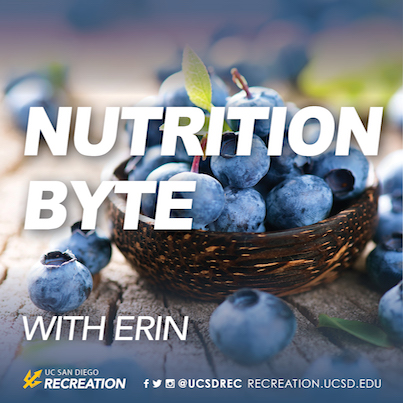By: Erin Kukura, MS, RD, UCSD Recreation Dietitian
Do you ever get an intense craving for a candy bar in the afternoon, or find yourself always craving something sweet or salty after dinner, while watching Netflix?
Well, cravings can be caused for a variety of reasons and they aren’t all bad! In fact, food cravings are normal, and can help guide your food choices for a satisfying meal or snack.
However, I frequently see cravings that are driven by physical and emotional hunger. Let’s break down both here.
Physical hunger – Physical hunger is normal hunger you experience in between meals or snacks. We might notice sensations such as a grumbling or empty stomach, headache, lack of concentration, low energy, and altered mood (aka “hangry”). Oftentimes, I see people go too long without eating, this leads to low blood sugar levels and drives our body to release a variety of hormones in response to this “primal” hunger. Hence, why we crave high-carbohydrate, and high-fat foods. The carbohydrates in these foods break down and lead to an increase in our blood sugar levels. We also seek out high fat foods because they are the most energy dense (contain the highest number of calories per gram of food). Physiologically, this makes sense! Our body thinks we are starving, and hence we crave high-carbohydrate or high-fat foods to compensate. Additionally, when we wait until we’re too hungry to eat, what happens? Are you enjoying and savoring every bite of that burger? No! You’re scarfing it down, only to get a stomach ache soon afterward. This way of eating not only does not feel good, but also causes your body to swing back and forth between under-eating and over-eating, which can cause additional stress.
I encourage you to take some time to think about when you’re cravings hit. Is it because you let yourself get too hungry? Is it at a certain time each day? If so, maybe you need a snack in between meals, or maybe your last meal wasn’t satisfying enough or didn’t include all the necessary components. This is where meeting with a Registered Dietitian can be helpful to offer suggestions in these areas.
Additionally, there’s emotional hunger. This might look like you just got home, ate dinner and are about to work on a paper when suddenly, you get a craving for a cookie! This differs from physical hunger in that you already ate, so unless your meal was inadequate or not satisfying, this craving is coming entirely in response to an emotion. Typically, we also end up feeling guilty after eating this way because we weren’t hungry to begin with. In this example, maybe you are eating in response to feelings of procrastination about studying or you are feeling stressed about how much work you have to do. Either way, emotional hunger stems from your emotions and not true hunger cues.
Now, as humans we are going to eat emotionally at times. The goal is not to “eliminate” it. But rather to look over your eating patterns. Do you find yourself oftentimes eating in response to emotions? Do you find yourself eating when you aren’t hungry? Do you have other coping mechanisms? If this is something you struggle with I encourage you to meet with a Registered Dietitian to look more thoroughly at your eating patterns and delve more into how you might be using food to cope and learn other successful coping strategies.
If you’d like assistance on your journey to well-being or feel that you would like to improve your relationship with food feel free to contact the Recreation Dietitian, Erin Kukura, MS, RD at ekukura@ucsd.edu
For more information on services go to: https://recreation.ucsd.edu/wellness-services/nutrition/


